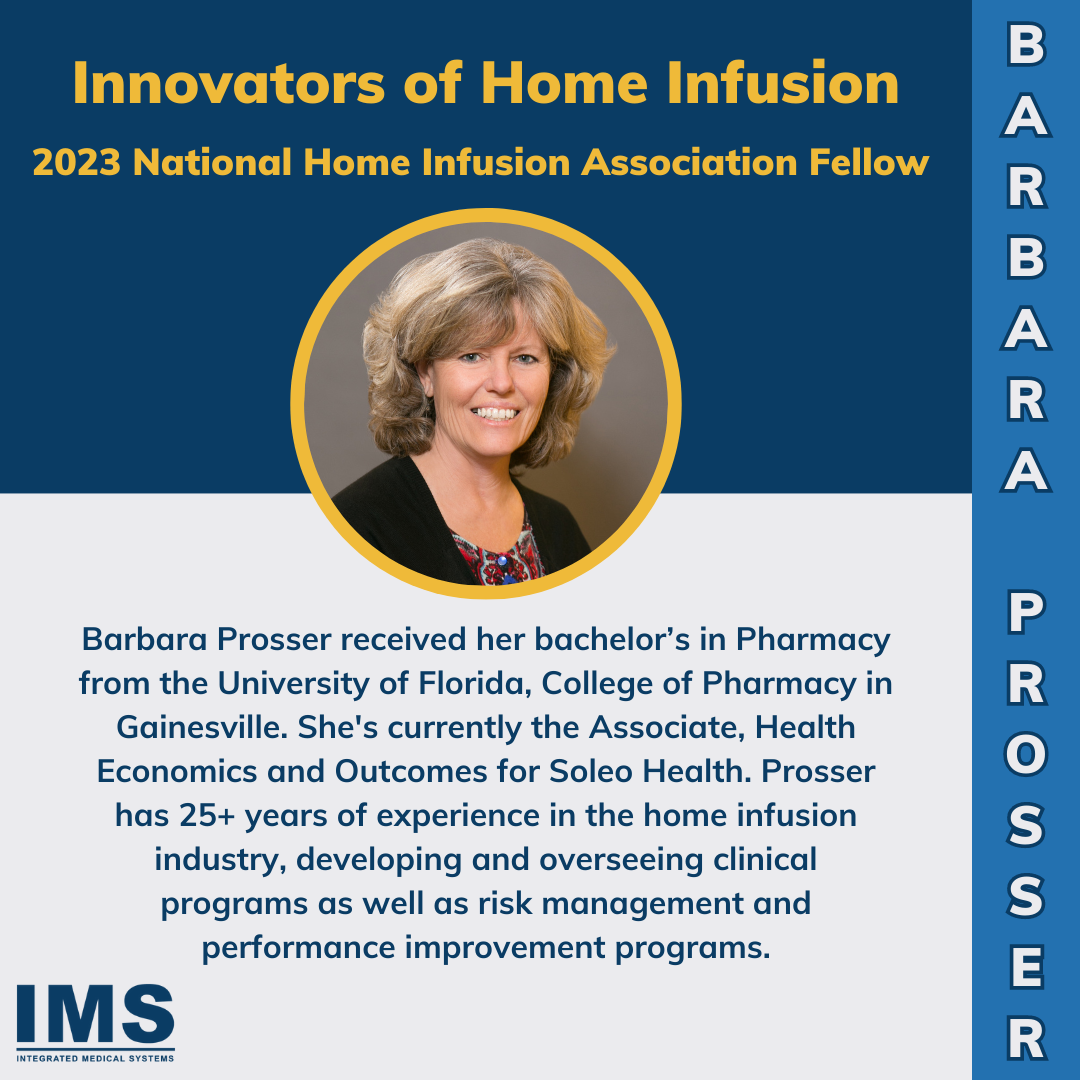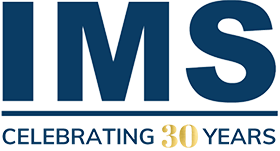Innovators of Home Infusion: Barbara Prosser
Join us as we continue our Innovators of Home Infusion series with an interview featuring Barbara Prosser, Associate, Health Economics and Outcomes Research for Soleo Health. With over 25 years of experience in the home infusion industry, Prosser has been recognized as a leader in the field! Come along as we delve into Prosser's life experiences and what it feels like to be recognized as a 2023 NHIA Fellow!
Our next innovator of home infusion is Barbara Prosser, Associate, Health Economics and Outcomes for Soleo Health. With over 25 years of experience in developing and overseeing clinical programs, risk management, and performance improvement programs in the home infusion industry, Barbara has a wealth of knowledge to share. With a bachelor's in Pharmacy from the University of Florida, College of Pharmacy in Gainesville and active involvement in the American Society of Health-System Pharmacists (ASHP), Barbara is an expert in the field. Join us as we delve into her journey, insights, and advice for those in the home infusion industry. Get ready to be inspired by a true innovator and leader in home infusion.


How did you first get into the home infusion industry?
In 1984, my husband and I were relocating to the Boston, Massachusetts area, looking to try a different arena in pharmacy. I researched what was involved in being a home infusion practitioner and decided to make a change from traditional hospital pharmacy practice. I was drawn to the opportunity to build a relationship with the patient and the providers, while clinically managing the patient.
How has the home infusion industry changed since you first started?
The reimbursement environment has changed and become much more complex. Reimbursement rates have decreased as medication costs have increased. As margins have shrunk, it has become harder to provide the necessary services to the patient. Not only is it harder to provide the essential services, but enhanced services such as clinical monitoring may suffer the consequences.
What is one thing you would change about the current state of home infusion? Why?
I would hope to see the role of the pharmacist recognized on a broader scale. The role of a pharmacist in the home infusion arena differs from other practice settings. Patient education, clinical monitoring and intervention resolution are key components for caring for patients in the home. More pharmacy residencies in home infusion, and recognition of certification programs, would lead to increased service to the patients and the providers. Payor recognition of enhanced pharmacy services and physician acceptance is paramount to this conversation.
What kind of an impact do you hope to have on the home infusion industry?
I hope to bring awareness to the importance of the role of the pharmacist in home infusion. My role in helping pharmacists identify interventions in clinical care and the impact of those interventions whether they have implications in cost of care or patient outcomes. Understanding and documenting interventions in patient care can help to identify opportunities for patient education, dosing adjustments and medication management, all leading to better patient outcomes. Data and results from pharmacy clinical monitoring and subsequent interventions provide real world evidence (RWE) of patient care and medication experience.
In what ways have the pioneers of home infusion strengthened the industry in your perspective and why?
Learning from and following the work of these pioneers continues to pave the way for innovation in the home infusion arena. The pioneers and their work in refining reimbursement models, strengthening educational opportunities and providing insight into issues in our field are invaluable. Knowing and learning from others facing the same similar issues is incredibly valuable in our day-to-day work.
How has the National Home Infusion Association (NHIA) guided your path to success?
NHIA has given me the opportunity to learn from others in my field. Attending meetings, networking and NHIA has also provided me a forum to share my experience and successes with others in the industry. The most valuable time has been spent as part of the committee membership and the opportunity to brainstorm and lead through collaboration with others in our field.
What does being recognized as an NHIA Fellow mean to you?
It is an incredible honor to be recognized by your peers. I am thankful for the opportunity to share my work and to learn from the best.
What advice would you give to yourself at age 18?
Keep trying and you will never miss an opportunity!
If you had a superpower, what would you want it to be?
Magic, I would like to be able to instantly make changes and make things happen!
If you weren't in the home infusion industry, what would you be doing?
Software development.
Biography:
Barbara Prosser’s current title is Associate, Health and Economics at Soleo Health, but she recently served as Vice President, Health Economics and Outcomes Research for Soleo Health. Prior to that, Barbara served as Vice President of Clinical Operations for Critical Care Systems/Accredo/Walgreens for 18 years. Prosser has 25+ years of experience in the home infusion industry, developing and overseeing clinical programs as well as risk management and performance improvement programs. In addition, she served as Surveyor in the Home Care, Ambulatory, and Network Accreditation programs for the Joint Commission for 10 years. Prosser has presented at numerous clinical meetings for the National Home Infusion Association (NHIA), American Society of Health-System Pharmacists (ASHP) and Infusion Nurses Society (INS), covering topics including performance improvement, competency assessment, risk management and ethics. She received her bachelor’s in Pharmacy from the University of Florida, College of Pharmacy in Gainesville. She is active in ASHP, where she has served as Chair and Director at Large for the Home and Ambulatory Care Section. In addition, she has served as a member and Vice Chair to the Joint Commission Professional Technical Advisory Committee and currently serves on the NHIA Standards Committee and Joint Commission Home Care Advisory Council.
